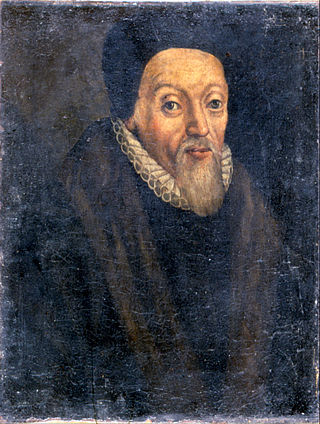Related Research Articles

At Trinity College Dublin and the University of Cambridge, a sizar is an undergraduate who receives some form of assistance such as meals, lower fees or lodging during his or her period of study, in some cases in return for doing a defined job.

Alexander Nowell was an Anglican priest and theologian. He served as Dean of St Paul's during much of Elizabeth I's reign, and is now remembered for his catechisms, written in Latin.

John Richardson was a Biblical scholar and a Master of Trinity College, Cambridge from 1615 until his death.
Father Richard Holtby was an English Jesuit superior and Roman Catholic priest.
Robert Beaumont was Master of Trinity College, Cambridge from 1561 to 1567 and twice Vice-Chancellor of the University of Cambridge. During this time, he commissioned Hans Eworth to copy the 1537 Hans Holbein portrait of King Henry VIII. This copy was bequeathed to Trinity College where it hangs to this day.
Robert Tounson — also seen as “Townson” and “Toulson” — was Dean of Westminster from 1617 to 1620, and later Bishop of Salisbury from 1620 to 1621. He attended Sir Walter Raleigh at his execution, and wrote afterwards of how Raleigh had behaved on that occasion.
Nicholas Fitzherbert was an English recusant gentleman who served as secretary to Cardinal William Allen and was found guilty of treason due to his Catholicism. He was the second son of John Fitzherbert of Padley, Derbyshire. Fitzherbert was the grandson of the judge Sir Anthony Fitzherbert (1470–1538), and first cousin to the Jesuit Thomas Fitzherbert. Whilst he was abroad, two priests were arrested at his father's house; they are now saints after becoming martyrs to their faith. Fitzherbert's lands were forfeit, and he was obliged to spend his life abroad. He was buried in Florence.

William Whitaker was a prominent Protestant Calvinistic Anglican churchman, academic, and theologian. He was Master of St. John's College, Cambridge, and a leading divine in the university in the latter half of the sixteenth century. His uncle was Alexander Nowell, the Dean of St. Paul's Cathedral and catechist.
Arthur Yeldard (c.1530–1599) was an English clergyman and academic, chosen as the first Fellow and second President of Trinity College, Oxford.
Everard Digby was an English academic theologian, expelled as a Fellow of St John's College, Cambridge for reasons that were largely religious. He is known as the author of a 1587 book, written in Latin, that was the first work published in England on swimming; and also as a philosophical teacher, writer and controversialist. The swimming book, De Arte Natandi, was a practical treatise following a trend begun by the archery book Toxophilus of Roger Ascham, of Digby's own college.
Hugh Gray was an English churchman and academic, and the second Gresham Professor of Divinity.
Robert Scott was an English churchman and academic, Master of Clare College, Cambridge and Dean of Rochester.
John Towers was an English churchman, Bishop of Peterborough from 1639, a royalist and a supporter of the ecclesiastical policies of William Laud.
Edward Grant was an English classical scholar, Latin poet, and headmaster of Westminster School. He was also the first biographer of Roger Ascham.
Ralph Churton was an English churchman and academic, archdeacon of St David's and a biographer.
John Allenson was an English puritan divine.
William Hyde (1597–1651) was an English Roman Catholic convert and priest, presumed to be of Dutch or Flemish background, who became President of the English College, Douai.
George Barcroft was an English composer of church music.
John Baret or Barrett, was an English lexicographer during the Elizabethan era, and was responsible for publishing a dictionary of English, Latin, Greek and French entitled An Alvearie.
John Hammond (1542–1589) was an English civil lawyer and politician.
References
- ↑ "Sanderson, John (SNDR554J)". A Cambridge Alumni Database. University of Cambridge.
- 1 2 3 4 Lee, Sidney, ed. (1897). . Dictionary of National Biography . Vol. 50. London: Smith, Elder & Co.
- ↑ Venn, John & JA (1927). Alumni Cantabrigienses, Part I, Vol. IV. Cambridge: Cambridge University Press. p. 16.
- ↑ Le Glay, A (1825). Recherches sur l'Eglise Metropolitaine de Cambrai. Paris.
- ↑ Blom, F.; Blom, J. "Sanderson, John". Oxford Dictionary of National Biography (online ed.). Oxford University Press. doi:10.1093/ref:odnb/24626.(Subscription or UK public library membership required.)
- ↑ Charles B. Schmitt (1983). John Case and Aristotelianism in Renaissance England. McGill-Queen's Press - MQUP. p. 141. ISBN 978-0-7735-6400-8.
- ↑ Ralph Churton (1809). The Life of Alexander Nowell, Dean of St Paul's. Oxford University Press. pp. 75–77 and 398–400.
- ↑ Joseph Gillow (1885–1902). A Literary & Biographical History, or Bibliographical Dictionary of the English Catholics from the Break with Rome in 1534 to the Present Time, Volume V. Burns & Oates. p. 479.
- Attribution
![]() This article incorporates text from a publication now in the public domain : Lee, Sidney, ed. (1897). "Sanderson, John". Dictionary of National Biography . Vol. 50. London: Smith, Elder & Co.
This article incorporates text from a publication now in the public domain : Lee, Sidney, ed. (1897). "Sanderson, John". Dictionary of National Biography . Vol. 50. London: Smith, Elder & Co.